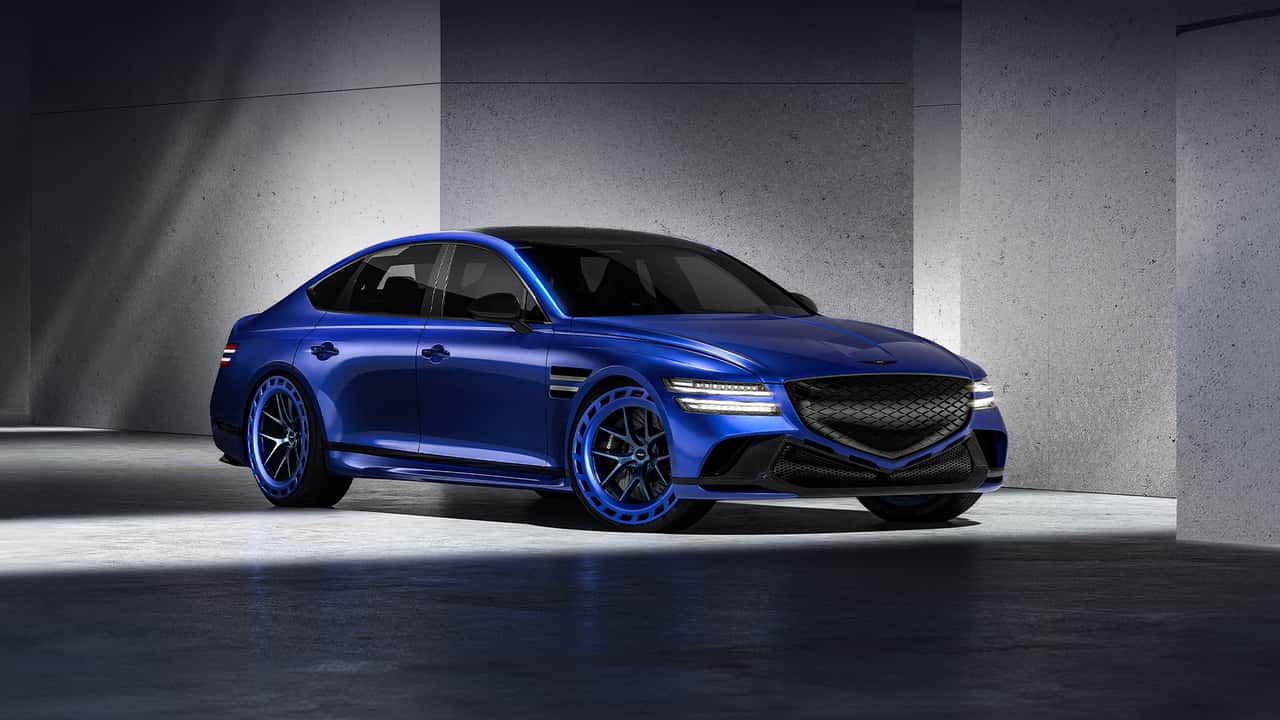Genesis, Hyundai Motor Group’s luxury automaker, had a plan of only selling new electric vehicles starting next year, but that plan seems to have changed.
Instead of going all-in on EVs, the Korean company will invest in bringing as many hybrids as possible as soon as next year to market, according to Genesis boss Mike Song, who spoke with TopGear on the sidelines of this year’s Goodwood Festival of Speed.
Get Fully Charged
The hybrid stopgap
This year is proving to be a roller-coaster ride for automakers who are trying to make it in the EV game. Some saw huge gains in sales, while others, including Tesla, saw their numbers drop as consumers seemed to employ a “wait it out” tactic. Companies like General Motors, Volkswagen and Kia are turning to hybrids to ease the transition to an all-electric lineup and to comply with upcoming emissions regulations. Genesis is getting in on the action now, too.
Currently, Genesis doesn’t sell any hybrid or plug-in hybrid, but with the new strategy in place, we’re bound to see them throughout the brand’s lineup. “We will apply it to as many models as possible,” Song said.
While this might come as a surprise, it shouldn’t. Kia, Hyundai’s sister company inside Hyundai Motor Group, already said that it’s working on adding more hybrids and plug-in hybrids across its portfolio of brands, so addressing the hybrid issue at Genesis was probably just a matter of time.
That said, the luxury automaker is still committed to having an all-electric lineup … at some point. “Electrification is still our vision. We will have 100% electrified vehicles, but the market and the customers now want hybrid more than EV, so we really want to bring Genesis hybrid into the market as soon as possible,” the brand’s boss told TopGear.
To solidify this, the same Mike Song said that Genesis is working on a new EV platform that, according to Edmunds, might be exclusive to the luxury brand and not shared with Hyundai and Kia, like the E-GMP platform that underpins models like the Hyundai Ioniq 5, Kia EV6 and Genesis GV60.

Genesis’ current EV portfolio (from left): Genesis GV60, Genesis Electrified GV70 and Genesis Electrified G80
As for what will power the new Genesis hybrids, we don’t know. They’ll likely use a similar setup as the upcoming Kia hybrids, but we’ll have to wait and see what that will be. An earlier report suggests that the GV70 SUV would get a range-extender hybrid for the 2026 model year in the United States, meaning it could be marketed as soon as next year.
If the latest X Gran Berlinetta and X Gran Racer Vision GT concepts have anything to do with reality, Genesis might cram a V6 and an electric motor under the hood of its upcoming hybrids. In the Berlinetta, the powertrain makes no less than 1,071 horsepower, while the Racer Vision GT ups that figure to a ridiculous 1,540 hp.
In a recent development, Genesis has announced a change in its strategy regarding the sale of electric vehicles (EVs). Initially, the luxury car manufacturer had planned to exclusively sell EVs in the near future. However, after conducting market research and analyzing customer preferences, Genesis has decided to tone down this plan and incorporate hybrid vehicles into its product lineup.
According to Genesis executives, the decision to include hybrid vehicles alongside EVs was driven by consumer demand. Contrary to their initial belief that there was a strong preference for EVs, the company found that customers are actually more inclined towards hybrid vehicles. This shift in consumer preferences has prompted Genesis to adjust its strategy and cater to the demands of the market.
Hybrid vehicles offer a unique combination of fuel efficiency and environmental friendliness, making them an attractive option for many consumers. By incorporating hybrid vehicles into its product range, Genesis is not only responding to customer preferences but also expanding its offerings to appeal to a wider audience.
This shift in strategy reflects the evolving landscape of the automotive industry, where consumer preferences and attitudes towards electric and hybrid vehicles continue to change. With an increasing emphasis on sustainability and environmental consciousness, hybrid vehicles have emerged as a popular choice for consumers looking to reduce their carbon footprint without fully committing to an all-electric vehicle.
Genesis’ decision to include hybrid vehicles in its lineup demonstrates its commitment to staying attuned to market trends and meeting the needs of its customers. By offering a diverse range of electrified vehicles, Genesis is positioning itself as a forward-thinking and customer-centric brand in the competitive automotive market.
As the automotive industry continues to evolve towards electrification, it is essential for car manufacturers to adapt to changing consumer preferences and market dynamics. Genesis’ decision to incorporate hybrid vehicles alongside EVs is a testament to its agility and willingness to listen to its customers, ensuring that it remains at the forefront of innovation in the ever-changing automotive landscape.

